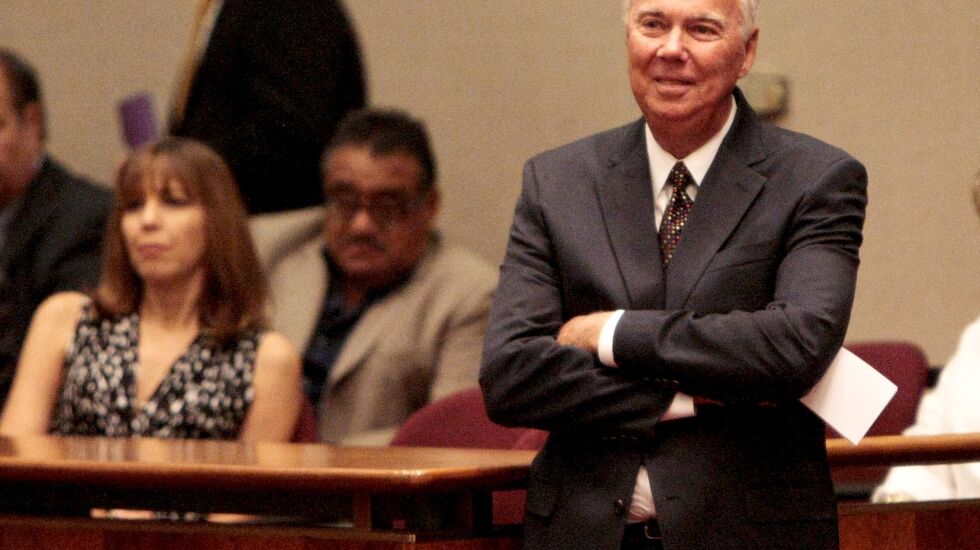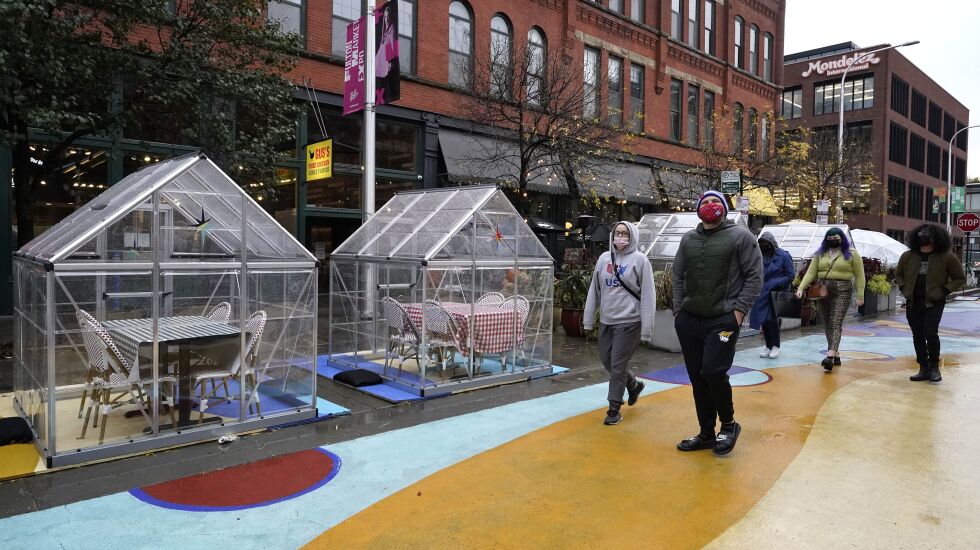With behind-the-scenes encouragement from perennial political power player Richard Mell, retiring Ald. Tom Tunney (44th) is warming to the possibility of joining the crowded field of candidates vying to replace Mayor Lori Lightfoot.
“He thinks I would be a good mayor. That’s all I can say,” Tunney, 67, said Monday. “He’s worked with me for years.”
Mell, 84, was uncharacteristically tight-lipped when asked what role he’s playing in trying to coax Tunney into the race.
“At this point, I’m not discussing that topic,” Mell said. “I’m not in a position to say anything about this now. Maybe later.”
Nine years after retiring from the Chicago City Council and passing the baton to his daughter, Mell was asked if he’s encouraging Tunney to run because he believes Chicago is at a crossroads.
He would only say: “Yes, we are.”

Other political sources have said Mell has been telling everyone who will listen that Tunney is in and will announce his candidacy the day after the Nov. 8 general election.
Tunney refused to go quite that far during Monday’s conversation with the Sun-Times.
But he made it clear he is warming to the idea and firmly believes there is a “lane” for him to win.
“A middle-of-the-road, not overly progressive, not overly conservative [candidate]. But somebody who’s managed a very successful ward and also did a lot on the Council floor, collaborating. There’s a lane, if I so choose,” said Tunney, owner of Ann Sather Restaurants.
“I know I’ll have business support. If you look at the rest of the candidates, I think I have a unique resume,” he added. “If I get in, I will definitely be very aggressive on fundraising.”
With Tunney’s consent, supporters have been out with nominating petitions the last few weeks, hoping to gather two or three times the 12,500 signatures needed to get on the ballot and survive a petition challenge.
“It’s going very well. ... We have volunteers. We’ve got paid staff. We’re trying to cross the spectrum of the city,” said Tunney, Lightfoot’s hand-picked Zoning Committee chair.
Lightfoot has $2.9 million in the bank, followed by former Chicago Public Schools CEO Paul Vallas, who is closing in on $2 million. Millionaire businessman Willie Wilson leads the hunt for campaign cash with $4.68 million in the bank. He has already devoted $6 million of his personal fortune to unseating the embattled incumbent he endorsed, and he said he is prepared to donate $3 million more.
Illinois Restaurant Association President Sam Toia has known Tunney, the association’s former chairman, for decades.
But Toia also has worked closely with Lightfoot, particularly during the pandemic, when the mayor closed streets and sidewalks to make way for more outdoor dining, throwing a lifeline to restaurants fighting for survival.
On Monday, Toia refused to say if he’d stay in Lightfoot’s camp, even if Tunney jumps in. He did say restaurant owners are pleased to have “been at the table instead of on the menu.”

With or without big bucks from the hospitality industry, Toia said Tunney’s candidacy could be a game-changer.
As Chicago’s first openly gay alderperson, he could cut into Lightfoot’s support in the LGBTQ community.
He could also hurt the mayor among lakefront voters whose support was crucial to Lightfoot’s 2019 win but who have grown disenchanted with her for not delivering on many progressive and transparency promises.
“There’s no question that Tom is someone that knows the city of Chicago. He grew up on the Southwest Side. He’s been a Chicagoan his whole life,” said Toia, and knows “the pulse of the hospitality industry, small business, development. He’s been an alderman dealing with all of these issues for the past 20 years.”
In August, Tunney hinted at his impending retirement from the Council, which he called “not a good place to work these days.”
He also teased a run for mayor, saying Chicagoans “want a unifier” and someone “who can bring people together.”
Lightfoot “can be somewhat divisive. She’s vulnerable. She knows that. A lot of people are looking for an alternative,” he said then.
“Her background as a prosecutor has some influence on the way she operates her office. ... It’s more like, ‘I’ve got all the answers, and we’re going my way.’ ... Her style is that of a prosecutor — you’re guilty until proven innocent. As a chief executive, she’s got to work more behind the scenes and be more collegial and respectful.”
For a generation of political junkies, Mell will be remembered for his jump-on-the-desk antics the night the Council chose Ald. Eugene Sawyer (6th) to succeed the late Mayor Harold Washington.
The infamous photograph that’s part of Chicago folklore captured the deal-making essence of Mell’s personality.
Although Mell was a self-made millionaire, he put aside his own political ambitions to advance the career of his son-in-law, Rod Blagojevich, first to the state legislature, then to Congress and the governor’s mansion.
In 2009, Gov. Blagojevich was impeached and removed from office, and in 2011 was convicted on federal corruption charges.
Even before then, in 2005, Mell had gone on a tirade after Blagojevich’s aides publicly linked him to a Joliet landfill that was shut down amid environmental violations.
The landfill was owned by a second cousin of Patti Blagojevich, the alderman’s daughter and governor’s wife.
Mell told the Sun-Times he regretted the day he backed Blagojevich for governor and hoped his daughter — who had “blinders on” about her husband — would “wake up someday.”
He compared himself to a spurned spouse who works tirelessly to put her husband through medical school, only to be replaced by a trophy wife.
Then, he dropped a bombshell that tore his family apart and drew the attention of state and federal investigators.
Mell charged that the governor’s chief fund-raiser, Chris Kelly, had traded prime state appointments for $50,000 donations to Blagojevich.
The alderman later recanted the charges under threat of a lawsuit by Kelly, who subsequently committed suicide after his own federal conviction. But the damage was done.
Mell would ultimately be vindicated by the conviction of his son-in-law. But he endured the emotional pain of watching his granddaughters grow up without their father.







